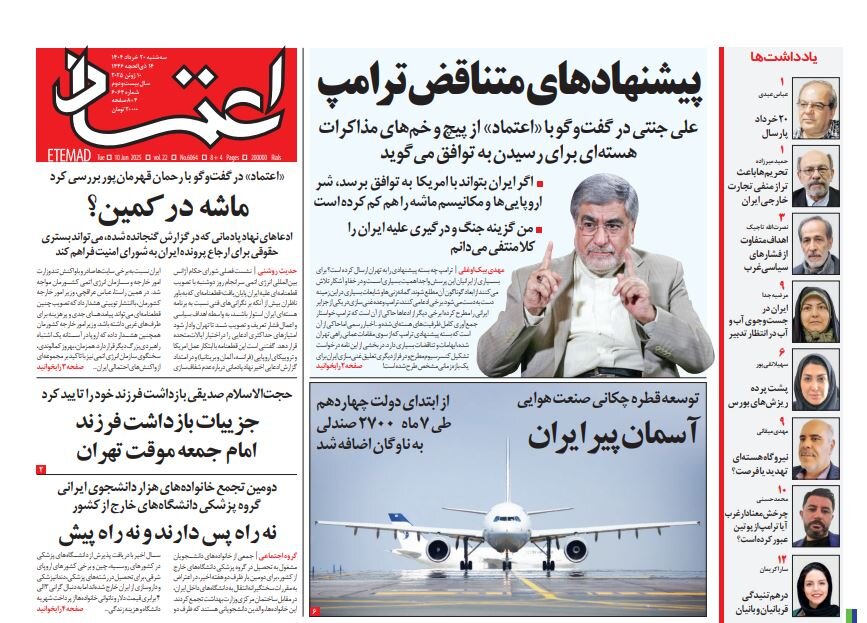Europe seeks to revive its role in the nuclear dispute

TEHRAN - Etemad discussed the European position on the Iran nuclear issue in an interview with Ramin Mehmanparast, the former Foreign Ministry spokesman.
He said: Today, Europeans are faced with a series of challenges in their relations with the United States; challenges that have emerged on issues such as the war in Ukraine, the status of NATO, and trade tariffs. Europeans were one of the main parties to the nuclear agreement with Iran in the past, but in recent years, they have become somewhat sidelined in the decision-making process. In these circumstances, Europe is striving to revive its role and position. The efforts to issue a resolution against Iran at the Board of Governors of the International Atomic Energy Agency are part of this strategy. Although the U.S. has announced that it will not support the tension-causing resolutions in the Board of Governors as long as its negotiations with Iran continue, it appears that these European actions are not only being taken with Washington's tacit consent but can also be interpreted as aligning with the United States’ policy of applying maximum pressure against Iran.
Javan: Grossi is a lever for issuing a resolution
In a note, Javan discussed the different approaches of Rafael Grossi, director general of the International Atomic Energy Agency. It wrote: After the Board of Governors meeting, the director general of the International Atomic Energy Agency, with a different approach that could be considered a green light for issuing a resolution (snapback mechanism) against Iran, made a series of claims about Iran's nuclear program, which included issues such as not confirming that the Iranian nuclear program is peaceful, dissatisfaction with Tehran's position in criticizing the Agency's report, and implicit bias towards the Zionist regime. These statements practically pave the way for issuing a strong resolution and referring it to the UN Security Council. Of course, Foreign Ministry spokesperson Esmaeil Baghaei has stated that the snapback mechanism should not be exaggerated as our nuclear work is peaceful and there is no legal excuse, reason, or basis for not removing the Iran nuclear issue from the agenda of the Security Council in October 2025, and any action taken to the contrary would be a political and politicized view of the opposing parties.
Sobh-e-No: The enemy's strategy for social engineering
In a commentary, Sobh-e-No dealt with the murder of a young girl in Tehran and the opposition's abuse of the incident. The paper said: In the era of hybrid warfare and complex psychological operations, the enemies of the Islamic Republic of Iran are exploiting the cultural sensitivities of our society to create chaos and instability. The key point here is that the opposition is exploiting the issue of women in Iranian-Islamic culture for influence. The hostile media is trying to turn individual cases into a public crisis, as they know that the issue of women is a red line for Iranians. They are trying to turn the murder into a lever of pressure, while dozens of women in America and Europe are becoming victims of violence, but do not get media attention. The political exploitation of the murder of a young girl is not a new act. However, the dimensions of the issue must be explained well, and the different views of women in Iranian society must be explained to everyone so that the enemies do not entertain the idea of hitting the Iranian nation by taking advantage of such mishaps.
Ettelaat: Perhaps the sixth round will be the last Iran-US dialogue!
Ettelaat talked to Hassan Hanizadeh, an international affairs analyst, about Trump's shaky behavior during the nuclear negotiations. He said: Donald Trump's dual behavior towards the Iranian nuclear file shows that the United States is not seeking to reach a fair and win-win agreement with Iran. For this reason, Trump tried to make public opinion skeptical about Iran's activities. Five rounds of talks have been held between the two countries, with the Americans insisting on stopping the enrichment cycle. We are ready to negotiate about 3.67 percent enrichment under the supervision of the International Atomic Energy Agency, but the Americans' obstruction continues; therefore, perhaps the sixth round will be the last round of talks between the Iranians and the Americans. It must be admitted that the influential lobby of the Zionist regime does not allow the White House to accept the continuation of Iran's enrichment. Of course, we should not ignore the fact that the military option has generally been removed from the U.S. agenda. Therefore, perhaps Iran's 3.67% enrichment under the supervision of the Agency could lead to interaction and, as a result, an end to the dispute.
Leave a Comment